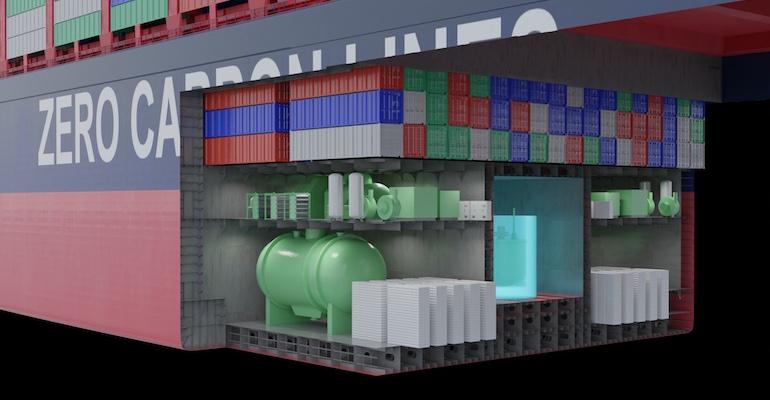ABS commissioned HEC to study the impact of nuclear propulsion installation on two common large merchant ship types – a 14,000 teu containership and 157,000 dwt Suezmax tanker.
For the 14,000 teu containership the study modeled the impact of installing two, lead-cooled, 30MW fast reactors, finding that this would both increase cargo capacity and operational speed.
In the case of Suezmax tanker the study looked at installing four, 5MW, heat-pipe microreactors, which would decrease cargo carrying capacity, but also increase operational speed.
In both cases the need for refueling was drastically reduced with the containership requiring no refeuling during a typical 25-year lifespan, and a single refueling in 25 years for the tanker.
Core-Power which is developing a small-scale atomic molten salt reactor for shipping has previously highlighted the lack of refueling means that nuclear propulsion would have a significantly different business model for vessel using atomic power. The upfront cost of the newbuilding, including fuel, would be much higher, but operating costs would be much lower eliminating the highest daily operating cost.
The findings of the study look likely to see ABS continuing its work to produce a safe model of nuclear propulsion for commercial shipping.
“Our findings from this latest cutting-edge research underscore why the industry cannot afford to ignore the vast potential offered by nuclear propulsion both in terms of emissions reduction and operational efficiency. A net-zero world is more easily realized through nuclear propulsion, and we are putting in place the foundations for that future today,” said Christopher J. Wiernicki, ABS Chairman and CEO.
While nuclear reactors have been used in naval vessels for decades, as well as icebreakers, safety concerns, as well as cost, have nixed development in commercial shipping. This could be changing though with the development of smaller, modular molten salt reactors.
“Advanced or small modular reactors address many of the issues traditionally associated with nuclear for commercial maritime use, with enhanced safety and efficiency, reduced cost and waste and proliferation prevention. Nevertheless, many questions need to be answered and it is critical that industry evaluate these technologies with a laser focus on safety,” Wiernicki added.
The US Department of Energy (DOE) has already awarded ABS a contract to research barriers to the adoption of advanced nuclear propulsion on commercial vessels as well as contracting the classification society to support research into thermal-electric integration of a nuclear propulsion system on a commercial vessel being carried out by the University of Texas.
Copyright © 2024. All rights reserved. Seatrade, a trading name of Informa Markets (UK) Limited.
Add Seatrade Maritime News to your Google News feed.  |

